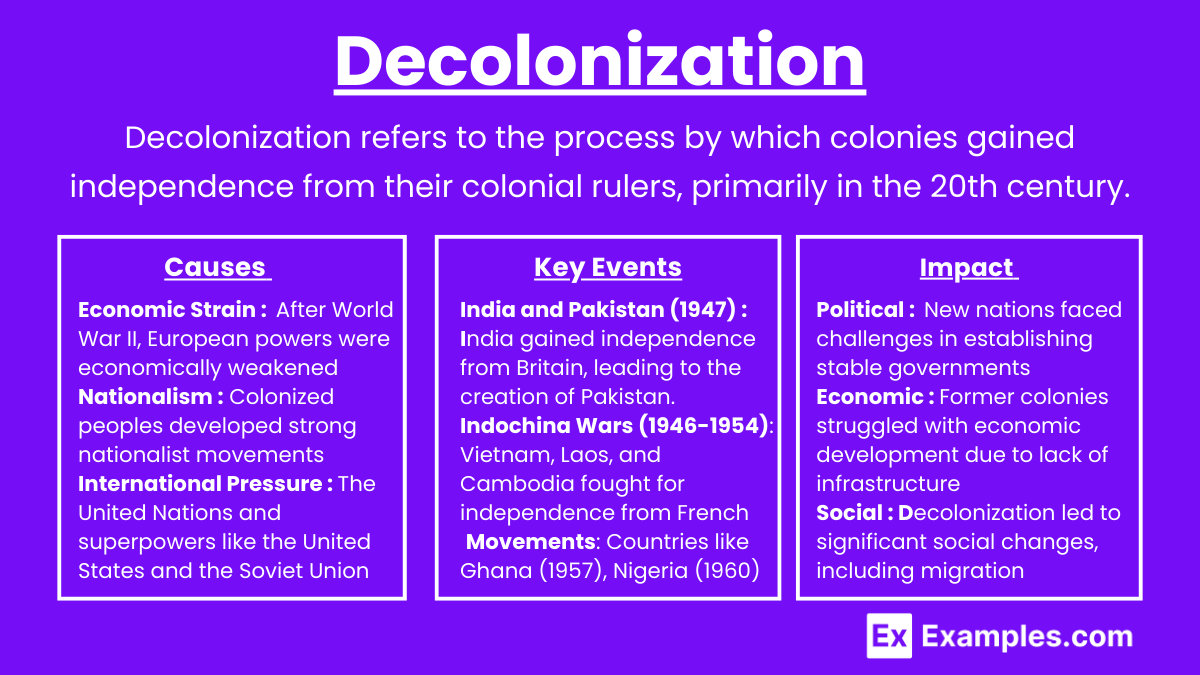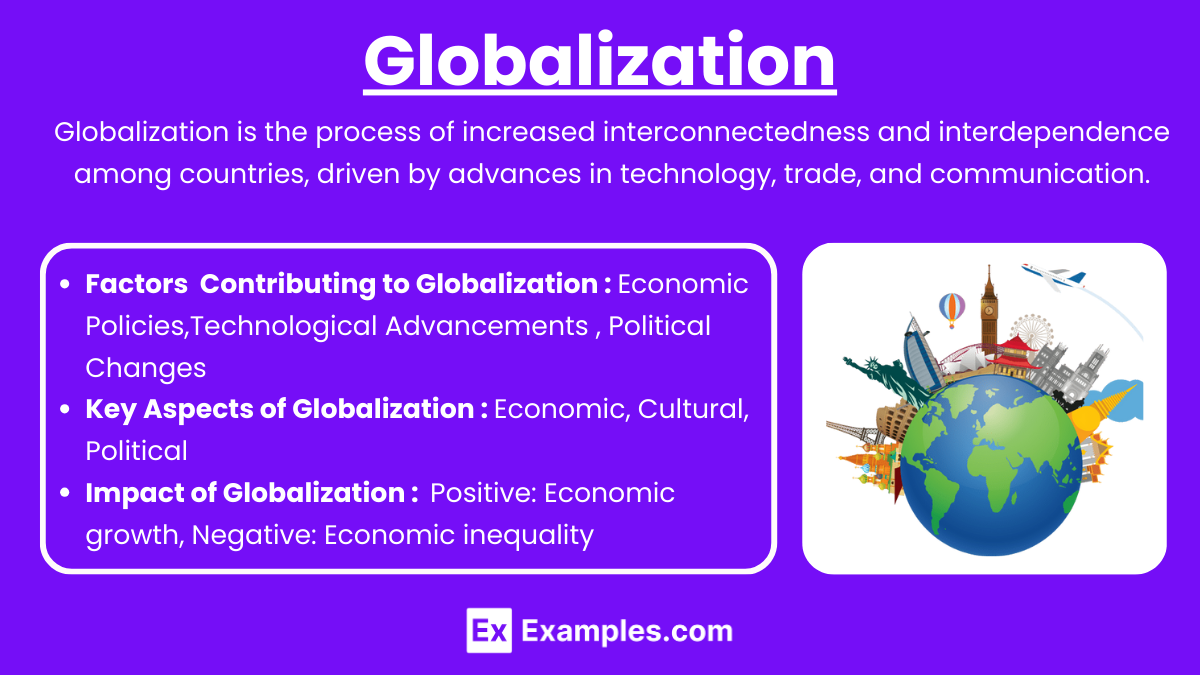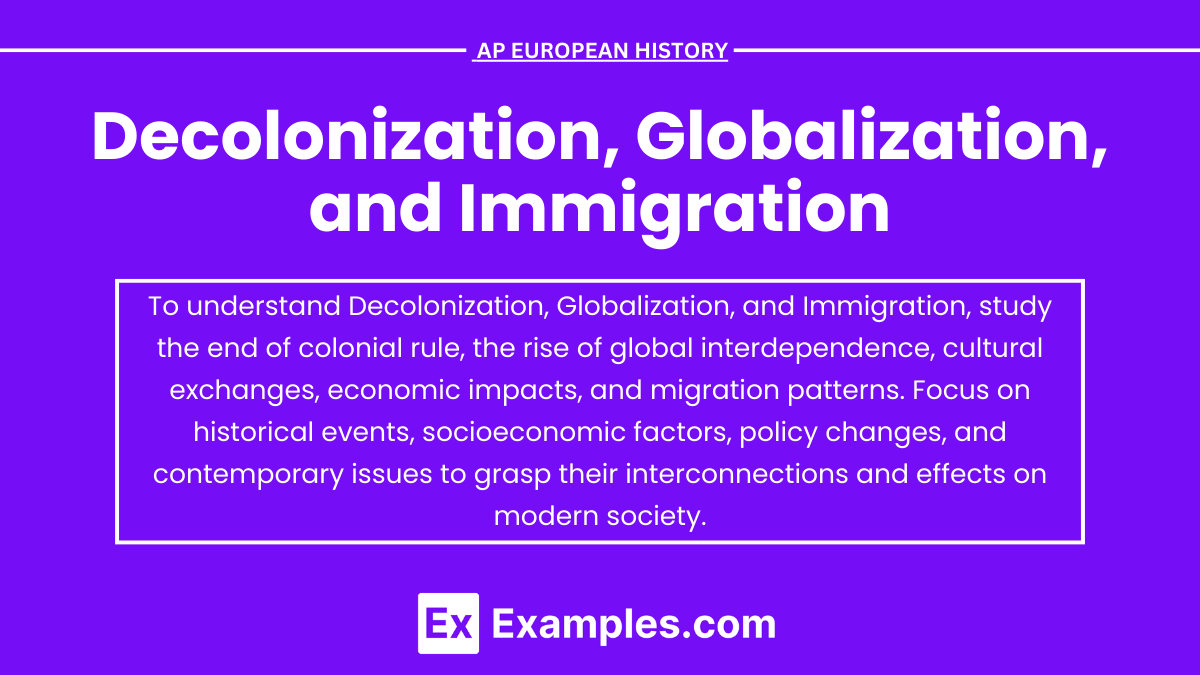The themes of decolonization, globalization, and immigration are crucial for understanding contemporary global dynamics and are integral to the AP European History curriculum. Decolonization refers to the process through which colonies gained independence from European powers, reshaping global political structures. Globalization encompasses the increasing interconnectedness of the world through trade, technology, and cultural exchange. Immigration, driven by economic opportunities and political instability, has significantly influenced demographic patterns and societal transformations across Europe and beyond.
Learning Objectives
By studying “Decolonization, Globalization, and Immigration” for the AP European History exam, you should learn about the causes and impacts of decolonization on former colonies and European powers, understand the economic, cultural, and political dimensions of globalization, and analyze historical and contemporary immigration trends and their effects on European societies. Focus on key events, figures, and policies, and examine the interconnections between these processes. This will help you grasp their significance in shaping modern Europe and the world.
Decolonization

Decolonization refers to the process by which colonies gained independence from their colonial rulers, primarily in the 20th century. This era marked the end of European imperialism and the establishment of new nations in Africa, Asia, and the Middle East.
Causes of Decolonization
- Economic Strain: After World War II, European powers were economically weakened, making it difficult to maintain control over colonies.
- Nationalism: Colonized peoples developed strong nationalist movements, demanding self-determination and independence.
- International Pressure: The United Nations and superpowers like the United States and the Soviet Union advocated for decolonization, viewing it as a moral imperative and a strategic advantage during the Cold War.
Key Events
- India and Pakistan (1947): India gained independence from Britain, leading to the creation of Pakistan.
- Indochina Wars (1946-1954): Vietnam, Laos, and Cambodia fought for independence from French colonial rule.
- African Independence Movements: Countries like Ghana (1957), Nigeria (1960), and Kenya (1963) achieved independence through a combination of political negotiation and armed struggle.
Impact of Decolonization
- Political: New nations faced challenges in establishing stable governments, often resulting in dictatorships or political instability.
- Economic: Former colonies struggled with economic development due to lack of infrastructure and continued economic dependence on former colonial powers.
- Social: Decolonization led to significant social changes, including migration, ethnic conflicts, and efforts to reclaim cultural identities.
Globalization

Globalization is the process of increased interconnectedness and interdependence among countries, driven by advances in technology, trade, and communication.
Factors Contributing to Globalization
- Technological Advancements: Innovations in transportation and communication (e.g., the internet, air travel) made it easier to connect globally.
- Economic Policies: Free trade agreements, deregulation, and the rise of multinational corporations facilitated international trade and investment.
- Political Changes: The end of the Cold War and the spread of liberal democracy promoted a global capitalist economy.
Key Aspects of Globalization
- Economic: The global economy became more integrated, with increased trade, foreign investment, and the rise of global supply chains.
- Cultural: Globalization led to the spread of cultural products and ideas, creating a more homogenized global culture but also sparking cultural exchanges and hybridization.
- Political: International organizations like the United Nations, World Trade Organization, and International Monetary Fund gained influence in global governance.
Impact of Globalization
- Positive: Economic growth, access to new markets, and technological advancements.
- Negative: Economic inequality, cultural homogenization, and environmental degradation.
Immigration

Immigration is the movement of people from one country to another with the intention of settling permanently or temporarily.
Causes of Immigration
- Economic Opportunities: People migrate in search of better job prospects and living standards.
- Political Instability: Wars, conflicts, and persecution drive people to seek refuge in more stable countries.
- Social Factors: Family reunification, education, and better healthcare are significant motivators for migration.
Historical Waves of Immigration
- Post-World War II Migration: Many Europeans emigrated to North America and Australia, while decolonization led to significant migrations within and out of former colonies.
- Late 20th Century: Economic globalization and political changes in Eastern Europe, Asia, and Africa led to increased migration flows.
- 21st Century: Conflicts in the Middle East, Africa, and Central America, along with economic disparities, have driven contemporary migration trends.
Impact of Immigration
- Economic: Immigrants contribute to the labor market, entrepreneurship, and innovation but can also strain public services and infrastructure.
- Social: Immigration fosters cultural diversity and social enrichment but can also lead to social tensions and integration challenges.
- Political: Immigration policies and debates have become central to political discourse, influencing elections and policymaking in many countries.
Interconnections Between Decolonization, Globalization, and Immigration
Decolonization and Globalization
- Decolonization often led to economic dependency on former colonial powers, which globalization either exacerbated or alleviated depending on the region and policies adopted.
- Newly independent states sought to integrate into the global economy, which was dominated by Western nations.
Globalization and Immigration
- Economic globalization created job opportunities and economic disparities, encouraging migration from poorer to richer countries.
- Advances in transportation and communication facilitated easier and faster migration.
Decolonization and Immigration
- Former colonies often had significant populations migrate to former colonial powers, creating multicultural societies in Europe.
- Political instability in newly independent states prompted waves of refugees and asylum seekers.
The processes of decolonization, globalization, and immigration have shaped the modern world significantly. They are interconnected phenomena that have transformed political borders, economic systems, and cultural landscapes. Understanding these historical processes is crucial for grasping contemporary global issues and their historical roots.
Examples
Example 1: India’s Independence and the Indian Diaspora (1947-Present)
After India gained independence from British rule in 1947, many Indians emigrated to countries like the United Kingdom, the United States, and Canada. This movement led to significant Indian communities abroad, influencing global culture and economy, exemplifying the intertwined nature of decolonization and immigration in the context of globalization.
Example 2: The Algerian War of Independence and Algerian Immigration to France (1954-1962)
Algeria’s fight for independence from France ended in 1962, resulting in a mass migration of Algerians to France. This movement impacted French society, highlighting the legacy of colonialism and the ongoing effects of globalization as former colonized populations integrated into European nations.
Example 3: Vietnam’s Independence and Vietnamese Immigration to the United States (1975-Present)
Following the end of French colonial rule in 1954 and later conflicts, significant numbers of Vietnamese people immigrated to the United States after the fall of Saigon in 1975. This migration reflects the global movement of people and the influence of political changes on immigration patterns.
Example 4: Post-World War II Decolonization and Caribbean Immigration to the United Kingdom (1948-Present)
The decolonization of the Caribbean led to a large number of immigrants moving to the United Kingdom, particularly in the late 1940s and 1950s. The arrival of the Windrush generation exemplifies how decolonization spurred immigration and contributed to the cultural globalization of British society.
Example 5: Syrian Refugee Crisis and Global Response (2011-Present)
The civil war in Syria, a former French mandate, has led to a significant refugee crisis with millions seeking asylum in Europe, North America, and neighboring countries. This situation illustrates the impact of political instability on global migration patterns and the interconnectedness of global societies in responding to humanitarian crises.
Multiple Choice Questions
Question 1
Which of the following best describes the process of decolonization?
A. The expansion of a country’s control over other territories.
B. The process by which colonies gain independence from colonial powers.
C. The integration of economies and cultures across national borders.
D. The movement of people from one country to another.
Answer: B. The process by which colonies gain independence from colonial powers.
Explanation: Decolonization refers to the period following World War II when many colonies in Africa, Asia, and the Caribbean gained independence from European colonial powers. This process involved political, economic, and social changes as newly independent nations sought to establish their sovereignty and identity separate from their former colonizers.
Question 2
How does globalization primarily affect immigration patterns?
A. By reducing the need for international trade.
B. By creating barriers to cultural exchange.
C. By increasing the ease and volume of cross-border movements.
D. By decreasing technological advancements.
Answer: C. By increasing the ease and volume of cross-border movements.
Explanation: Globalization enhances connectivity and interdependence among countries through advancements in technology, communication, and transportation. These changes make it easier for people to move across borders, leading to increased immigration as individuals seek better economic opportunities, education, or safety.
Question 3
What is a common challenge faced by immigrants in a globalized world?
A. Reduced access to digital communication.
B. Difficulty in establishing a new cultural identity.
C. Decreased opportunities for international travel.
D. Limited exposure to diverse cultures.
Answer: B. Difficulty in establishing a new cultural identity.
Explanation: Immigrants often face challenges in adapting to a new cultural environment while maintaining their own cultural identity. This can lead to issues of integration, cultural conflict, and the need for balancing multiple cultural influences. In a globalized world, the rapid exchange of ideas and practices can both help and hinder this process, making it complex for immigrants to find their place in a new society.


